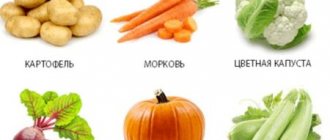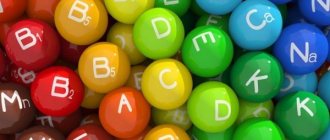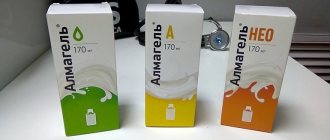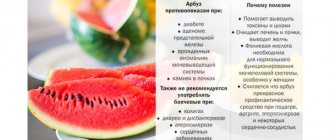Why you need to take vitamins for pancreatitis
Pancreatitis in various manifestations causes damage to health, regardless of the patient’s age. A person loses his appetite during treatment and the course of the disease, a diet is prescribed for a long time, and sometimes he has to adhere to the necessary fasting. This leads to a low intake of nutrients and vitamins into the body, because foods high in such components are often contraindicated.
The functioning of the pancreas is disrupted when the body lacks a supply of substances responsible for the production of hormones and digestive juice.
Poor absorption of starchy substances is observed, and sugar accumulates in the blood. Progression occurs:
- Diabetes.
- Pancreatitis.
- Cystic fibrosis.
To reduce the risk of developing these diseases, a person is recommended to change his diet and use special vitamin complexes.
First of all, the pancreas needs B vitamins. They contribute to the production of insulin. The organ also needs substances such as glutamic acid, cystine, nickel, and sulfur.
The pancreas is involved in the digestion process. It regulates energy metabolism and promotes the breakdown of food. One of the functions of the organ is the production of pancreatic juice. It contains enzymes and hormones that promote the digestion of proteins, fats and carbohydrates and regulate glucose levels. Pancreatic juice enters the duodenum through the ducts, where it begins its work.
Sometimes enzymes and hormones are retained in the pancreas, which leads to inflammation of the organ tissue. This condition is called pancreatitis. Without treatment, the disease negatively affects the liver, kidneys, and heart. To improve the digestion process and prevent hypovitaminosis, patients with pancreatitis are prescribed vitamins of groups A, B, C, E. The drugs must be taken in long courses of 2-3 months. Then follows a break for 2-3 weeks.
Multivitamin complexes are prescribed based on test results and if the patient has the following symptoms:
- hair loss;
- brittle nails;
- nausea;
- vomit;
- decreased immunity;
- rashes or dry skin.
Vitamins for pancreatitis are used in courses several times a year. It is not recommended to take them constantly. The need for them is due to several reasons:
- Strict adherence to the diet. Dietary nutrition, along with the use of medications, forms the basis of therapy. Restrictions in food lead to hypovitaminosis, which disrupts the functions of all organs and systems, including the pancreas. Enzyme deficiency worsens even more.
- Loss of vitamins with diarrhea and vomit during the period of exacerbation of the disease. Taking replacement medications becomes mandatory for the patient. They interrupt the vicious circle that has arisen and help improve the condition.
Vitamin deficiency becomes a serious consequence for the body. As a rule, a deficiency of necessary elements leads to a malfunction of many organs and an exacerbation of the disease. Externally, vitamin deficiency manifests itself in a similar way:
- weight loss;
- skin rashes, excessive dryness;
- hair loss;
- brittle nails;
- unhealthy complexion.
To maintain the body, restore damaged cells of the pancreas and other organs, and consolidate the results of the treatment received, additional intake of the necessary medications is required.
Groups of vitamins
Vitamins are responsible for normal metabolism and the body's defenses.
Today there are many drugs for vitamin therapy. But each drug belongs to a specific group and performs a specific function.
Group of B vitamins. With pancreatitis, patients develop a deficiency of B vitamins.
By the way, it is the vitamin that is responsible for normal metabolism and the body’s defenses. Symptoms that appear with a lack of this vitamin:
- Insomnia
- Mood swings
- Lost appetite
- Possible constipation or diarrhea
- Recurrent headache
- Inflammation of the oral mucosa
These are the most common symptoms. Therefore, if there is a deficiency of this vitamin, it is recommended to take medications that contain:
- Vitamin B1. Takes part in chemical processes. Normalizes the level of proteins, fats and carbohydrates. This vitamin protects the body from dehydration during pancreatitis.
- Vitamin B2. Performs the function of redox reactions of the body.
- Vitamin B6. Responsible for normalizing enzyme production. It is used for diseases such as pancreatitis and cholecystitis.
- Vitamin B9. It is also called folic acid. It is responsible for normalizing blood counts, hemoglobin and red blood cells. It is usually prescribed for pancreatitis, cholecystitis, gastritis, and pregnancy. In general, it is prescribed for symptoms such as nausea, vomiting and sudden weight loss.
- Vitamin B12. This vitamin is involved in the process of fat breakdown and is responsible for normalizing metabolism. The administration of vitamin B12 is mandatory for liver diseases and cholecystitis.
This entire classification group is contained in monopreparations. In addition, after consulting with your doctor, you can select a suitable vitamin complex. In addition to medications, the presence of B vitamins is found in food products:
- Buckwheat
- Meat
- Fish
- Broccoli
- Millet
- Dairy products (cheese, milk, cottage cheese, sour cream, etc.).
In general, taking vitamin supplements is necessary, but eating food that contains vitamin B is much healthier.
It is eating that gives more guarantee that the body will absorb the vitamin.
Is it possible or not to take vitamins for pancreatitis?
The use of vitamins for chronic pancreatitis is necessary. As a result of enzyme deficiency, the digestive process is disrupted, which causes inadequate absorption of nutrients supplied with food. This condition leads to a deterioration in health and slows down the process of restoration of the damaged organ. Not only the pancreas, but also the entire body suffers from a lack of vitamins, the functioning of internal organs changes, and tissue structures undergo significant changes.
Vitamins are needed for the normal course of the digestive process, they ensure the normal course of biochemical processes, participate in the process of hematopoiesis, support the functionality of the central nervous system, cardiovascular and immune systems. Vitamins are necessary in the formation of enzymes and hormones; due to vitamins, the body’s protective abilities to the effects of toxins and free radicals are increased.
Other groups of vitamins
Rose hips contain vitamin C.
In addition to medications and foods containing vitamin B, the body may lack other vitamins. Each vitamin performs its own function and affects the human body.
Vitamin RR. When a patient lacks this vitamin, he feels aversion to food, dry mouth, and the stomach does not produce gastric juice. There may also be constipation or diarrhea.
Vitamin PP, also known as nicotinic acid, is prescribed in the remission stage to normalize the production of gastric juice in pathologies of the digestive system. In addition, nicotinic acid has a vasodilating effect, improves blood circulation and tissue nutrition.
Vitamin A. It is an antioxidant. Responsible for facilitating the process of fat breakdown and has a positive effect on the digestion process due to dysfunction of the organ.
Vitamin A is found in broccoli and liver. If the patient has a vitamin A deficiency, this may affect the eyes. This may manifest itself in deterioration of vision at dusk, and dryness of the mucous membrane of the eye may also appear. With a lack of vitamin A, the immune system weakens and a person may get sick more often.
Vitamin C. This vitamin is also called ascorbic acid. Its main task is to increase the level of iron in the blood, a positive effect on the immune system and the endocrine system of the body. Often, with a lack of this vitamin, the following symptom appears: even with a minor blow, a bruise appears on the body. Vitamin C is found in the following foods:
- Broccoli
- Red cabbage
- Rose hip
- Sea buckthorn
In fact, there are many more products containing vitamin C. Here are the more popular ones. After pancreatitis, patients are allowed and even recommended to take vitamin C in the form of a pharmaceutical medicine.
Vitamin E. This vitamin is simply irreplaceable. It is involved in the process of cleansing the body of toxins and free radicals.
Relieves inflammation of the pancreas and normalizes the functioning of the digestive organs. This vitamin also stabilizes intestinal function, eliminates stool disorders caused by pancreatitis, cholecystitis, gastritis and colitis.
What vitamins should you take in addition to treating pancreatitis?
When sick, the body is weakened, food digestion is impaired, and access to necessary elements is limited. Pharmaceuticals come to the rescue. There are no specially created vitamins “for pancreatitis”. To recover, a person requires the following elements: B vitamins, vitamins A, E, C, PP. Let's take a closer look at the order of administration and the effect on the body.
B vitamins
Usually, the lack of this group is acutely felt in pancreatitis. These vitamins have a strengthening effect on the immune system and significantly correct metabolism. Representatives of the B series are known in several types; taking each type is important for the body, especially with pancreatitis. With inflammation of the pancreas, a deficiency of vitamins of this group is often observed. They belong to the category of coenzymes. Group B is responsible for reducing the level of bad cholesterol in the blood and increasing immunity.
Let's discuss the varieties in more detail.
- Vitamin B1 (thiamine). It is considered an important element involved in metabolic actions involving proteins, carbohydrates and fats. Monitors the water and salt content in the body, eliminating dehydration. The norm is considered to be 2 mg of thiamine entering the body. The high content in some acceptable foods will additionally help the body. Benefits include: broccoli, green peas, carrots, pumpkin, red bell peppers, wheat, legumes, milk.
- Vitamin B2 (riboflavin). Participates in redox reactions. The optimal intake per day is 0.03 g, divided several times using injections or tablets. Buckwheat and dairy products are full of vitamin B2. Spinach, fish, meat, cottage cheese, and buckwheat porridge are rich in vitamin B2.
- Vitamin B6. Stimulates the process of production of digestive enzymes. Injected into the body. Millet and buckwheat, liver will further compensate for the lack of the compound.
- Vitamin B9 (folic acid). Helps relieve symptoms of the disease, normalizing blood condition, restoring the body. Typically taken in tablet form. Contained in white cabbage and broccoli, cereals. Fermented milk products, eggs, pomegranates, and nuts are rich in vitamin B9.
- Vitamin B12. Responsible for the functioning of the liver, actively participates in the processing of fats and carbohydrates, helping to calm and facilitate the process. It is administered into the body by injection, sometimes in tablets. Sources include fish, lean meats, and cheese.
These products can be consumed in the absence of allergic reactions, intolerance, or high fat content.
The components listed below play an important role in recovery and treatment.
Nicotinic acid (vitamin PP)
This element is directly involved in stimulating the formation of gastric juice, relieves inflammation, improving metabolism and the functioning of the circulatory system. Nicotinic acid is often prescribed for chronic disease or during rehabilitation.
Please note that taking medications is mandatory; it is impossible to compensate for the vitamin deficiency with food. Nicotinic acid is poorly absorbed by the body; additional consumption of meat, cereals, and wholemeal flour will be beneficial.
Vitamin C (ascorbic acid)
It is known that vitamin C has the ability to strengthen human immunity. In addition to helping to relieve the inflammatory process, ascorbic acid regulates hemoglobin in the blood, optimizes the presence of cholesterol, and enhances the functioning of the endocrine system.
Sea buckthorn, rose hips, citrus fruits, all types of cabbage, cherries are allowed for nutrition during the course and remission of the disease. The fruits and vegetables listed above will significantly enrich your diet with vitamin C.
Vitamin E
A well-known source of antioxidants, it helps remove free radicals and other harmful elements from the body. It has a beneficial effect on the functioning of the gastrointestinal tract, reducing inflammation and pain, and helps overcome constipation. Known products containing the element are rose hips, sea buckthorn, oatmeal and barley.
A deficiency of vitamins C and E in the body can lead to the formation of stones.
Vitamin A
A natural antioxidant that stimulates the breakdown of fats, which greatly facilitates the digestion of food in case of a damaged organ. Helps the body recover from infections and diseases, strengthening tissues. Broccoli, liver, and cheese contain a fair amount of the compound. There are known drugs that combine the content of several necessary components.
Macro- and microelements needed by patients with pancreatitis
In addition to vitamins, with pancreatitis the need for certain minerals increases. The body needs the following minerals and trace elements:
- calcium;
- potassium;
- zinc;
- chromium;
- sulfur;
- nickel.
The chronic form of pancreatitis is accompanied by impaired digestion of fats with the development of calcium and potassium deficiency. Particularly acute is calcium deficiency, which can worsen osteoporosis in older people suffering from chronic pancreatitis. Therefore, with a long course of the disease, it is necessary to take calcium and vitamin D supplements for better absorption of the mineral.
Chromium and zinc are important in pancreatitis from the point of view of the participation of the gland in the production of insulin. Chromium normalizes blood glucose levels and prevents the development of diabetes. Zinc regulates the synthesis of pancreatic hormones, including insulin. With its participation, the formation, secretion and utilization of the hormone occurs. The element prevents increased insulin production and protects the beta cells of the gland from destruction (it is in them that the hormone is produced).
Nickel prolongs the action of insulin by reducing its production by the pancreas. In chronic pancreatitis, nickel, along with other trace elements, prevents the development of diabetes mellitus.
A component of insulin produced by the gland is sulfur. The element is part of sulfur-containing amino acids and participates in enzymatic reactions and protein synthesis. Sulfur has detoxifying properties, which is important for chronic inflammatory processes in the gland.
Considering the fact that dietary nutrition is prescribed for pancreatitis, many foods, including some vegetables and fruits, are contraindicated, the body must receive vitamins and minerals in the form of medications. In acute pancreatitis, fasting is prescribed, then a special diet. Vitamins and minerals are prescribed by the attending physician. The pharmaceutical industry does not produce special vitamin-mineral complexes intended specifically for patients with pancreatitis.
What microelements should you take?
With pancreatitis, the body is weakened, food digestion is impaired, and the absorption of necessary elements is limited. Of course, the body suffers from this. Each element is needed so that one of the others can be assimilated. Vitamin D is not absorbed, which means most of the calcium will leave your body. To correct this condition, special complex preparations with microelements are used.
Vitamins for the pancreas are needed in the same way as for all other body systems. But you need to understand that there are no special vitamins for pancreatitis. To recover, you will need to follow a special diet and take medications. But in order for the body to function normally, it needs vitamins B, A, E, C, P. If intestinal function is impaired, then the absorption of these microelements will be minimal. Let's look at the effects of each of these elements on the body.
Vitamin complexes
Such multi-tablets also contain other substances necessary for the functioning and restoration of the body and pancreas. This includes zinc, cobalt, magnesium, glutamic acid. If the vitamins described above are recommended for humans in their pure form for auxiliary therapy in the treatment of a disease, then multivitamin preparations will serve as an excellent addition to general strengthening purposes and for the prevention of deficiency.
The most famous brands of complexes: Vitrum, Complivit, Multitabs, Duovit, Supradin. Available in the form of capsules and tablets. Taking the necessary vitamins facilitates treatment and rehabilitation and helps replenish the body with lost elements. When using pharmaceutical drugs, you should follow some rules.
Complivit
A mineral complex with vitamins A, E, group B and C, iron, phosphorus and 6 more minerals replenishes the body’s daily need for nutrients. The drug improves metabolism and increases performance. Complivit is available in tablet form. The complex is contraindicated in case of individual intolerance to the active components. Side effects include allergic reactions.
Supradin
The vitamin preparation improves immunity and improves the patient’s overall well-being. It contains vitamins B, H, D and C. Minerals – calcium, zinc, magnesium, iron. Supradin is produced in the form of tablets: effervescent or smooth-coated. The drug is contraindicated in hypercalcemia and renal failure. Sometimes it causes allergies and indigestion.
Vitrum
The multivitamin complex contains important vitamins and minerals - A, group B, PP, C, E, manganese, molybdenum, zinc. It strengthens health and improves well-being.
Allergic reactions are possible when taken. Vitrum is contraindicated in the following conditions:
- hypervitaminosis of vitamins D, A;
- children under 18 years of age;
- pregnancy;
- breastfeeding.
Vitamins necessary for the gland
Improper functionality of the pancreatic gland is formed due to the lack of elements responsible for the production of hormonal elements and pancreatic juice. When starchy substances are poorly digested, glucose accumulates, which leads to the development of diabetic disease.
To eliminate the possibility of developing diseases, the patient’s diet for pancreatitis must be correct, including taking a vitamin complex.
First of all, it is recommended to take drugs that contain group B substances. They are prescribed for pancreatitis in order to increase the production of glucose. In addition, the liver and pancreas require the following elements:
Important vitamins for the pancreas during pancreatitis.
When there is a lack of B substances during pancreatitis, it is felt quite acutely. Pancreatic vitamins of this group help strengthen the immune system and correct metabolism.
- Thiamine (B1) is an element that participates in the metabolic process with the assistance of carbohydrates, fats, and proteins. This vitamin controls the volume of water and salt, eliminating dehydration. This vitamin is found in carrots, pumpkin, broccoli, and red sweet peppers.
- Riboflavin (B2) – appears in the redox process.
- Element B6 – stimulates the production of enzymes.
- Folic acid (B9) – helps eliminate signs of illness, normalizes blood flow, and renews the body.
- Element B12 is responsible for the functioning of the liver, takes an active part in the enrichment of fats, carbohydrates, soothes and relieves.
Nicotinic acid - vitamin PP - this element stimulates the formation of juice in the stomach, eliminates inflammation, develops metabolic processes, and the functionality of the circulatory system. Nicotinic acid is often prescribed during the chronic development of pancreatitis or during the rehabilitation period. The substance is present in beets, buckwheat porridge, and meat.
Ascorbic acid – vitamin C – helps strengthen the immune system. In addition, the element relieves inflammation, improves the hemoglobin ratio, improves the presence of cholesterol, and increases the activity of the endocrine system. To replenish this element, currants, rowan, rose hips, and sea buckthorn are used.
Tocopherol (E) – for pancreatitis, it is beneficial due to its antioxidant properties, stimulating phenomena in the stomach and intestines, and reducing pain discomfort caused by damage to the pancreas. The vitamin is often prescribed for diabetes, which plays an important role in insulin deficiency in patients with pancreatitis. The element is found in rosehip, sea buckthorn, oatmeal and barley.
Retinol (A) is a natural antioxidant, stimulates the breakdown of fats, which significantly facilitates the digestibility of foods during pancreatitis. The element helps in restoring the body after pathologies and infectious lesions, strengthens tissues. The element is found in foods that have a beneficial effect on the body during pancreatitis - liver, cheese, broccoli.
For pancreatitis and cholecystitis
Inflammation of the pancreas often develops against the background of gallbladder diseases. Cholecystitis is complicated by increased stone formation and disruption of the sphincter of Oddi. Stones block the common bile and pancreatic ducts, causing bile stagnation. To normalize the functioning of the sphincter and prevent the formation of stones, you need to take the following vitamin complexes with a high content of ascorbic acid and alpha-tocopherol:
- Multi-tabs;
- Aevit;
- Alpha tocopherol acetate.
Multi-tabs
A combined preparation with vitamins A, E, group B and C increases the body's resistance to infections, improves lipid metabolism, and prevents premature aging of the body. Available in the form of tablets of 30 or 90 pcs. Multi-tabs is contraindicated if you are allergic to the composition of the product.
Aevit
The combination product contains retinol and alpha-tocopherol. The pharmaceutical effect of the drug is determined by its constituent components. The complex is produced in the form of capsules of 20 pcs. Long-term use may cause diarrhea and nausea.
Aevit is prescribed with caution for the following conditions:
- viral hepatitis;
- cirrhosis of the liver;
- pregnancy;
- thyrotoxicosis.
Alpha tocopherol acetate
The drug replenishes vitamin E deficiency. It takes part in metabolic processes and inhibits the oxidation of unsaturated fatty acids. Available in capsules. Allergic reactions are possible when taking the drug. Alpha tocopherol acetate is used with caution in the following conditions:
- increased blood clotting;
- myocardial infarction;
- risk of sudden blockage of blood vessels.
The best remedies for cholecystitis
Often pancreatitis is a consequence of cholecystitis, the course of which is complicated by stone formation. This is explained by the fact that at the mouth of the nipple of Vater, the pancreatic, bile, and common ducts open.
From there the juice with bile comes to the duodenum. Bile stagnation is formed from bile pigments and cholesterol. The main provocateur of this condition is poor nutrition. Vitamins E, B, C help stop the development of the pathological process. They help normalize the functioning of the gallbladder.
For pancreatitis in old age
As the body ages, the functions of the pancreas decline. Organ tissues undergo irreversible changes. Against this background, metabolism slows down, problems with digesting food appear. Chronic diseases and increased blood viscosity can cause exacerbation of pancreatitis in old age. To improve the functioning of the stomach and intestines, doctors recommend that people over 50 take special vitamins and food supplements. They are selected taking into account the person’s age and the presence of concomitant diseases.
More often, elderly patients are prescribed the following medications:
- Alphabet;
- Adaptovit;
- Centrum.
Adaptovit
This dietary supplement contains vitamin E and kelp extract. The product increases the body's resistance to infections and accelerates metabolism. The dietary supplement is available in drops, but is rarely found in Moscow pharmacies. Sometimes the drug provokes a skin rash. Contraindicated in alcoholism.
Alphabet
The complex of vitamins for pancreatitis consists of three types of tablets of yellow, pink and white with different dosages of calcium, selenium, folic acid and vitamins D, C, E and A. The drug has a general strengthening effect, replenishes the deficiency of minerals and substances. Available in tablets of 60 pcs. There are no side effects from taking it, but the complex is contraindicated in case of hyperfunction of the thyroid gland.
Centrum
The drug is prescribed to people over 60 years of age as an additional source of ascorbic, folic and nicotinic acid, B vitamins. It improves digestive function and stimulates the immune system. Produced in tablets of 30 pcs. for packaging. There are no data on side effects or contraindications.
Therapy with vitamin and mineral complexes
A balanced complex is drunk during times of relative well-being. The names of the drugs differ, but they contain substances with minerals.
Prescribing an approximate treatment course and dose, taking into account the age, especially the elderly, and the patient’s well-being, remains with the doctor. If there is a severe form of deficiency, then it is preferable to take vitamins in the form of injections.
It is important to remember that for nutrients, hypervitaminosis becomes more dangerous due to their lack. The beneficial effect will come quickly if you drink them on time and when indicated. Only then can it be realistic to live for a long time without exacerbation of pancreatitis.
With exacerbation of pancreatitis
Compliance with medical recommendations and diet helps to quickly relieve inflammation of the pancreas. An exacerbation of the disease is possible if the patient refuses to take medications or does not adhere to nutritional rules. Enzyme preparations and the following supplements help achieve remission:
- Duovit;
- Retinol acetate;
- Antioxicaps.
Duovit
The combined preparation contains all the necessary vitamins for pancreatitis and gastritis - A, E, D, C and group B. It improves the digestion process and promotes tissue restoration. Produced in the form of dragees, 40 pcs. for packaging. With long-term use, skin rash and exacerbation of asthma are possible. Duovit is contraindicated if the composition is intolerant.
Retinol acetate
This is vitamin A in capsules of 3.3 thousand IU in one piece. The drug has a general strengthening effect, has antioxidant properties, and improves fat metabolism. Price per pack of 10 pcs. – 7-20 rub. Retinol acetate is contraindicated in chronic pancreatitis. May provoke the following adverse reactions:
- lethargy;
- headache;
- drowsiness;
- nausea;
- vomiting;
- skin rash;
- facial redness;
- leg muscle soreness.
Antioxicaps
This drug stimulates the immune system, improves the synthesis of collagen and pancreatic hormones. It contains ascorbic acid, alpha-tocopherol, beta-carotene. Antioxicaps is available in capsules of 20 pcs. The drug is contraindicated in case of intolerance to the composition. Sometimes allergies occur after taking it.
Causes of pancreatitis
Currently, pancreatitis is quite common among the population of reproductive age. This is usually associated with chronic nicotine intoxication, alcohol abuse and “fast” food, as well as eating and sleeping disorders. All these factors predispose to the development of pancreatic inflammation. The above reasons influence the human body from the outside. In addition, there are endogenous, or internal factors that have a damaging effect on the pancreas. These include: cholelithiasis, hereditary predisposition to the disease, inflammatory diseases of the stomach and intestines, physiological changes during pregnancy, hypertension and others.
Insulin formation
Chronic hypovitaminosis provokes the development of diabetes mellitus. Insulin and glucagon are produced in the pancreas. The normal course of the process depends on the amount of vitamins in the body. Diet is of great importance, since with pancreatitis, carbohydrate metabolism is disrupted, which causes constant changes in sugar levels in the blood and urine. The patient needs to constantly monitor glycemia. Insulin therapy is carried out until glucose levels stabilize; such therapy is prohibited for a long period.
What does a lack of vitamins lead to?
In severe cases of the disease, vitamin deficiency is observed. As a rule, a deficiency of necessary elements leads to a malfunction of many organs and an exacerbation of the disease. How can external manifestations suggest vitamin deficiency:
- Weight loss.
- Skin rashes and excessive dryness of the skin.
- Hair loss.
- Brittle nails.
- Gray complexion.
To maintain normal functioning of the body, you need to take additional vitamins. They are also needed for the pancreas, as they allow its damaged cells to recover. And without this it is very difficult to achieve stable remission.
The most important vitamins for the pancreas
The most valuable for pancreatitis are B vitamins, ascorbic acid, vitamins A and E.
- Vitamin B1 (thiamine) is actively involved in the synthesis of pyruvic acid and controls blood glucose levels. The vitamin prevents the development of hyperglycemia. The pancreas synthesizes insulin, and with a sufficient supply of thiamine, this process goes smoothly. Thiamine normalizes carbohydrate and fat metabolism and is part of the amylase enzyme synthesized by the pancreas.
- Vitamin B2 (riboflavin) is part of enzymes produced by the pancreas. The vitamin is actively involved in protein metabolism, participating in redox reactions.
- Vitamin B3 (nicotinic acid) is involved in the formation of gastric juice. The vitamin is useful in remission of the disease.
- Regulates the function of the pancreas, helps digestion, vitamin B5 (nicotinic acid). The vitamin activates the metabolism of proteins and fats. When the pancreas is inflamed, it is poorly absorbed and must be taken in the form of tablets and injections.
- For normal synthesis of proteolytic enzymes, the pancreas needs vitamin B6 (pyridoxine). Under its influence, a number of enzymes involved in the breakdown of proteins and amino acids are synthesized in the liver. This alleviates the condition of the pancreas during inflammation.
- With pancreatitis, the body needs ascorbic acid. Pathology of the gland is accompanied by the formation of free radicals, which vitamin C successfully fights. Ascorbic acid activates the immune system and fights infection, which is important for such a debilitating disease as pancreatitis.
- Vitamin E (tocopherol) helps ascorbic acid in destroying free radicals. Tocopherol has detoxifying properties, helping the sick body get rid of toxins and waste. Vitamin E prevents the development of scars due to inflammation of the pancreas. Fat-soluble vitamin E, when following a diet low in fat, is in short supply and requires entry into the patient’s body from the outside.











